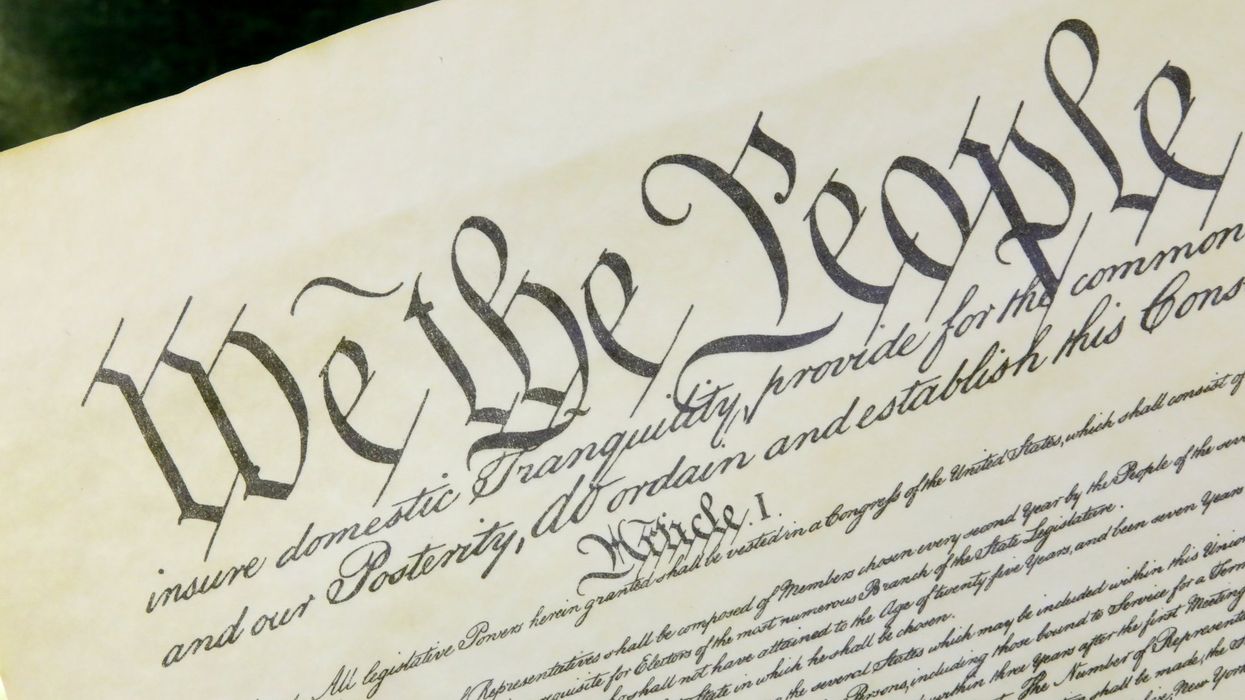The United States of America is at a precarious moment. Our Constitutional republic is hanging by a thread when the President himself seems uncertain about his obligation to uphold the Constitution — while those who do are being honored for their courage, as though fidelity to our founding principles were exceptional rather than fundamental. The U.S. Constitution is what holds us together as a nation. Without allegiance to it, I fear we risk losing our very identity.
Meanwhile, the legislative branch envisioned by our founders as having the most power has completely abdicated its duty of good governance, surrendering instead to partisanship.
President Trump appeared on NBC News’ “Meet the Press” on Sunday morning, May 4. When Host Kristen Welker asked whether due process should apply to both citizens and noncitizens, citing the Fifth Amendment, Trump replied “I don't know. I'm not, I’m not a lawyer.”
“Welker followed up: ‘Don't you need to uphold the Constitution of the United States as president?’” Trump’s response was troubling. “I don't know. It seems — it might say that, but if you're talking about that, then we'd have to have a million or 2 million or 3 million trials,” the President responded. “We have thousands of people that are—some murderers and some drug dealers and some of the worst people on Earth...I was elected to get them the hell out of here and the courts are holding me from doing it.”
In a time when leadership should reaffirm our commitment to the Constitution, uncertainty in its defense is not only troubling—it threatens the very fabric of our republic.
But even more concerning was this exchange. Welker asked whether he needed to “uphold the Constitution of the United States as president” and Trump said: “I have to respond by saying, again, I have brilliant lawyers that work for me, and they are going to obviously follow what the Supreme Court said.”
The President must recognize that he is responsible for the execution and enforcement of laws created by Congress, not to defer to the current U.S. Supreme Court, but to uphold the Constitution itself. Yet, he seems poised to ignore this sacred responsibility without consequence.
Just 104 days ago, Trump took his oath for the second time: "I do solemnly swear (or affirm) that I will faithfully execute the Office of President of the United States, and will to the best of my ability, preserve, protect and defend the Constitution of the United States.”
In the sitcom “Friends”, Chandler tells Rachel and Ross that his girlfriend Janice is mad at him. Chandler tells his friends “Janice asked me, do I look fat today, and I looked at her.” In which Ross jumps in and responds “You looked at her? You never look. You just answer. It’s like a reflex.” Rachel and Ross explain to Chandler that there can be no pause, you just need to reflexively be able to answer.
Not to diminish the precarious situation the country is in by quoting a television comedy series, but the same instinctive certainty should be expected from all elected officials, and especially our chief executive, when asked whether he will uphold the Constitution of the United States. There should be no hesitation and a proud exclamation of “Yes!”
The events of Jan. 6, 2021, made one thing unmistakably clear. Donald Trump holds no love or commitment to our Constitutional order. He should never have been entrusted with holding the highest office again.
The founding fathers understood the potential for corruption and established the process for impeachment and Congress’ responsibility with it in Article II, Section 4 of the Constitution. Unfortunately, out of control partisanship has prevented Congress from upholding its authority. With no meaningful effort to restore accountability, presidential power continues to go unchecked.
On the very same day that Trump refused to commit to upholding the Constitution, Vice President Mike Pence received the John F. Kennedy Library Foundation 2025 Profile in Courage Award “for putting his life and career on the line to ensure the constitutional transfer of presidential power on January 6, 2021.”
Ambassador Caroline Kennedy and Jack Schlossberg highlighted the significance of Pence’s actions stating, “Despite our political differences, it is hard to imagine an act of greater consequence than Vice President Pence’s decision to certify the 2020 presidential election during an attack on the U.S. Capitol. Upholding his oath to the Constitution and following his conscience, the Vice President put his life, career, and political future on the line. His decision is an example of President Kennedy’s belief that an act of political courage can change the course of history.”
This is the dire situation we are in as a country: The President of the United States openly questions whether he must abide by the Constitution, while we feel compelled to give out awards to brave men and women who do.
Only when members of Congress prioritize putting the country over party, as Pence did, will we have any hope of rebuilding this great experiment. Sadly, I am not holding my breath.
Lynn Schmidt is a columnist and Editorial Board member with the St. Louis Post-Dispatch. She holds a master's of science in political science as well as a bachelor's of science in nursing.




















Trump & Hegseth gave Mark Kelly a huge 2028 gift